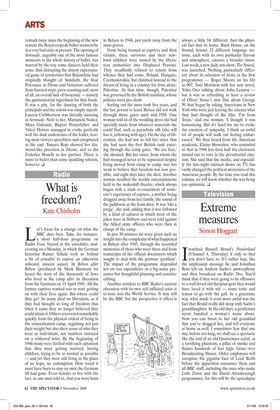What is freedom?
Kate Chisholm
Let’s focus for a change on what the BBC does best. Take, for instance, a short half-hour programme on Radio Four, buried in the schedules, midevening on a Monday, in which the German historian Rainer Schulz took us behind a bit of actualité to expose an otherwise unheard, unseen aspect. In Belsen after Belsen (produced by Mark Burman) we heard the story of the thousands of Jews who lived in the camp after its liberation from the Germans on 15 April 1945. All the former captives wanted was to start getting on with their lives again. But where could they go? So many died on liberation, as if they had thought so long of freedom that when it came they no longer believed they could attain it. Others recovered remarkably quickly from the physical ordeal of being in the concentration camp, regaining not just their weight but also their sense of who they were as individuals, not numbers tattooed on a withered wrist. By the beginning of 1946 many were fuelled with such optimism that they were getting married, having children, trying to be as normal as possible — and yet they were still living in the place of no hope, no redemption. How weird it must have been to stay on once the German SS had gone. Even weirder to live with the fact, as one man told us, that you were born in Belsen in 1948, just yards away from the mass graves.
From being treated as captives and then victims, these survivors and their newborn children were turned by the liberation authorities into Displaced Persons. They steadfastly refused to return from whence they had come, Poland, Hungary, Czechoslovakia, but clutched instead to the dream of living in a country for Jews alone: Palestine. At that time, though, Palestine was governed by the British mandate, whose policies were pro-Arab.
Sorting out the mess took five years, and the last person to leave Belsen did not walk through those gates until mid-1950. One woman told us of the wedding dress she had specially made from whatever materials she could find, such as parachute silk (she still has it, yellowing with age). On the day of liberation, she had run to tell her sister that she had seen the first British tank entering through the camp gates. ‘We are free,’ she shouted. But her sister, from whom she had managed never to be separated despite being moved from camp to camp, was too weak to believe that freedom was now possible, and eight days later she died. Another woman recalled the weekly entertainments held in the makeshift theatre, which always began with a stark re-enactment of someone’s experience of capture, a mother being dragged away from her family, the sound of the jackboots at the front door. It was ‘like a purge’, she said, adding that it was followed by a kind of cabaret in which most of the jokes were in Hebrew and were told against the Allied army officers who were then in charge of the camp.
In just 30 minutes we were given such an insight into the complexity of what happened in Belsen after 1945, through the recorded memories of those who were there and from transcripts of the official documents which sought to deal with the postwar ‘problem’. The impact of the programme depended not on vast expenditure or a big-name presenter but thoughtful planning and sensitive editing.
Another antidote to BBC Radio’s current obsession with its own self-inflicted crisis is to tune into the World Service. It may still be the BBC but the perspective it offers is always a little bit different. Just the physical fact that its home, Bush House, on the Strand, houses 32 different language stations, each with its own particular flavour and atmosphere, ensures a broader vision. Last week, a new daily arts show, The Strand, was launched. Nothing particularly different about its selection of items in the first programmes — Roger Moore on his life as 007, Toni Morrison with her new novel, Yoko Ono talking about John Lennon — but it was so refreshing to hear a review of Oliver Stone’s new film about George W. that began by asking Americans in New York who were just leaving the cinema what they had thought of the film. ‘I’m from Texas,’ said one woman. ‘I thought it was humanising. But it’s hard for me to evoke the emotion of sympathy. I think an awful lot of people will walk out feeling embarrassed.’ We then heard from the American academic, Elaine Showalter, who reminded us that in 1996 less than half the electorate turned out to vote in the presidential election. She said that the media, and especially the late-night satirical shows on TV, has vastly changed the political awareness of the American people. By the time you read this column, we will know whether she was being too optimistic. ❑


















































































 Previous page
Previous page